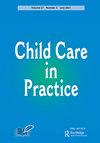The Many Youths of Hard Times: Observing and Understanding Young People’s Biographical Troubles
IF 1.4
Q3 FAMILY STUDIES
引用次数: 0
Abstract
The genesis of this special issue was in 2020 when both editors joined the organising committee of the mid-term conference of Research Network (RN) 03 of the European Sociological Association (ESA) “Biographical Perspectives on European Societies”. The purpose of this online conference event was to initiate critical discussion and debates about opportunities and challenges for the application of biographical research methods during COVID-19 lockdowns with regards to data collection, analysis, interpretation and ethics. This initial introduction spawned further dialogues between the editors throughout 2021 about the impacts of COVID-19 on youth, and possibilities for further extending these discussions into a special issue that would capture young people’s experiences of hard times, not alone during the recent COVID-19 pandemic but also in relation to homelessness, family relationships, emotions, education and war. This special issue represents the culmination of these critical discussions amongst us as editors, with authors and with colleagues in Ireland, Portugal, the UK, Denmark and Ukraine, about ways of thinking and observing emotionally turbulent times, structural constraints and (self)care dynamics in young people’s “life histories, lived situations and personal experiences” (Wengraf, 2011, p. 1). The term “hard times” itself, potentially at the origin of biographical crises (Caetano, 2021), is multidimensional, and the process of conducting depth research with youth experiencing difficult moments, be it emotionally, physically or financially (or indeed, all three simultaneously), is ethically challenging and is frequently a sensitive and emotionally fraught process for researchers. The meaning of hard times as applied to young people’s lives is contextual and temporal; pejoratively speaking, it evokes Dickensian overtones of brutalised childhoods and adolescence, while for sociologists it frequently connotes economic hardships (Lim & Laurence, 2015; Thébaud & Sharkey, 2016), austerity (Allen, 2016), precarity (Horton et al., 2021), experiences of criminality, gang culture (Foote-Whyte, 1981), and various types of emotional crises, mistrust and traumas spawning from parental neglect, physical and sexual abuse (Tsui et al., 2010). The complexity of young people’s everyday experiences in difficult social conditions pertaining to housing, migration and economic marginalisation are well highlighted in recent biographical research (Farrugia, 2021; Mayock & Parker, 2021; McGarry, 2021). Internationally, this field yields rich insights into the complexity of young people’s experiences in late modernity, showing the multidimensionality of the concept of youth (Cuervo et al., 2023; Pabian & Vandebosch, 2021; Renzaho et al., 2017). Social change processes and transitions are also key to understanding young people and how they go through difficult moments in their lives (Furlong & Cartmel, 2007; Irwin & Nilsen, 2018; Woodman & Wyn, 2015). The scale and depth of political and societal crises facing contemporary youth cannot be disconnected from the fact that it is more “networked” than ever before through globalisation and continuous technological innovations. As the艰难时期的许多年轻人:观察和理解年轻人的传记困境
本期特刊的起源是在2020年,当时两位编辑都参加了欧洲社会学协会(ESA)“欧洲社会的传记视角”研究网络(RN) 03中期会议的组织委员会。本次在线会议活动的目的是就COVID-19封锁期间应用传记研究方法在数据收集、分析、解释和伦理方面的机遇和挑战发起批判性讨论和辩论。这一初步介绍促使编辑们在整个2021年期间就COVID-19对青年的影响进行了进一步的对话,并探讨了进一步将这些讨论扩展到一个特刊的可能性,该特刊将捕捉年轻人在艰难时期的经历,不仅是在最近的COVID-19大流行期间,而且还涉及无家可归、家庭关系、情感、教育和战争。本期特刊代表了我们作为编辑,与爱尔兰、葡萄牙、英国、丹麦和乌克兰的作者和同事之间进行的这些批判性讨论的高潮,讨论了思考和观察年轻人“生活史、生活状况和个人经历”中的情感动荡时期、结构性约束和(自我)护理动态的方式(Wengraf, 2011, p. 1)。“艰难时期”一词本身,可能是传记危机的起源(Caetano, 2021)。是多维的,对经历困难时刻的年轻人进行深入研究的过程,无论是情感上、身体上还是经济上(或者实际上,三者同时发生),在伦理上是具有挑战性的,对研究人员来说,这往往是一个敏感和充满情感的过程。对年轻人来说,困难时期的意义是有背景的和暂时的;贬损地说,它唤起了狄更斯对残酷的童年和青春期的暗示,而对社会学家来说,它经常意味着经济困难(Lim & Laurence, 2015;thsambaud & Sharkey, 2016),节俭(Allen, 2016),不稳定(Horton et al., 2021),犯罪经历,帮派文化(foot - whyte, 1981),以及各种类型的情感危机,不信任和父母忽视,身体和性虐待所产生的创伤(Tsui et al., 2010)。在最近的传记研究中,年轻人在住房、移民和经济边缘化等困难社会条件下的日常经历的复杂性得到了很好的强调(Farrugia, 2021;Mayock & Parker, 2021;McGarry, 2021)。在国际上,这一领域对晚期现代性中年轻人经历的复杂性产生了丰富的见解,显示了青年概念的多维性(Cuervo et al., 2023;帕比安和凡德博斯,2021;Renzaho et al., 2017)。社会变革过程和转变也是理解年轻人以及他们如何度过生活中的困难时刻的关键(Furlong & Cartmel, 2007;Irwin & Nilsen, 2018;Woodman & Wyn, 2015)。当代青年面临的政治和社会危机的规模和深度,离不开这样一个事实:通过全球化和不断的技术创新,他们比以往任何时候都更加“网络化”。随着
本文章由计算机程序翻译,如有差异,请以英文原文为准。
求助全文
约1分钟内获得全文
求助全文
来源期刊

Child Care in Practice
Nursing-Community and Home Care
CiteScore
3.30
自引率
5.30%
发文量
32
期刊介绍:
Child Care in Practice is a quarterly, peer-reviewed journal that provides an international forum for professionals working in all disciplines in the provision of children’s services, including social work, social care, health care, medicine, psychology, education, the police and probationary services, and solicitors and barristers working in the family law and youth justice sectors. The strategic aims and objectives of the journal are: • To develop the knowledge base of practitioners, managers and other professionals responsible for the delivery of professional child care services. The journal seeks to contribute to the achievement of quality services and the promotion of the highest standards. • To achieve an equity of input from all disciplines working with children. The multi-disciplinary nature of the journal reflects that the key to many successful outcomes in the child care field lies in the close co-operation between different disciplines. • To raise awareness of often-neglected issues such as marginalization of ethnic minorities and problems consequent upon poverty and disability. • To keep abreast of and continue to influence local and international child care practice in response to emerging policy. • To include the views of those who are in receipt of multi-disciplinary child care services. • To welcome submissions on promising practice developments and the findings from new research to highlight the breadth of the work of the journal’s work.
 求助内容:
求助内容: 应助结果提醒方式:
应助结果提醒方式:


